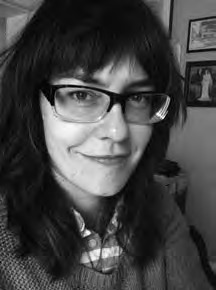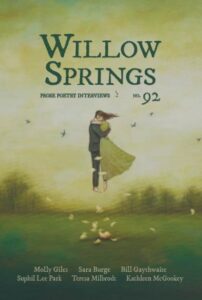
About Susan McCarty
Susan McCarty’s stories and essays have appeared in The Iowa Review, the Utne Reader, The Collagist, Conjunctions, Indiana Review, Willow Springs, and other journals. Once upon a time, she was an assistant editor at Penguin and Avalon Books. More recently, she’s been an administrative fellow for FC2, an artist-in-residence at VCCA and a Steffensen-Cannon scholar. She has an MFA from Vermont College and a PhD from the University of Utah. She teaches creative writing at Salisbury University.
A Profile of the Author
Notes on “Fellowship”
When I started “Fellowship,” I was working on a story about a group of high school newspaper journalists, which was somewhat inspired by the wonderful Sam Lipsyte story “The Dungeon Master” in terms of dorkiness and youthful obsession. After trying to get my story off the ground several times, I was ready to give up on it. To my ear it sounded too autobiographical, sentimental and anecdotal, like a story someone would tell at a high school reunion. Nostalgia is a tricky thing to wield: it can be a touchpoint for emotion, but it can also be shlocky, or worse, boring to everyone who is not you, like when you try to explain a really great dream to someone. So I backed up and thought about what I wanted to explore in a story set in my own teenagerhood (high school in Iowa in the ’90s): I wanted to tell the story of a girl who is really starting to struggle against the values of the culture around her in a way that was bound up with, but not directly caused by, her parents’ impending divorce. I wasn’t interested in revisiting specific details or scenes from my own life, but I did draw on my own emotional experience of my parents’ divorce when I was eighteen. I was interested in that moment when everything seems to be stretched to the breaking point, that moment right before the release of this person into the world, just before her escape. But I was uninterested in moralizing that tension. Sometimes it feels like every story about a teenage girl who has sex ultimately ends with the girl dropping out of high school, pregnant and alone and, yes, that’s a reality for some girls, but ultimately the dominance of that narrative in our culture speaks more to a fear of female sexuality and the resulting desire to control it.
I’m interested in another narrative, where girls have sex and parents and boyfriends disappoint them, and life goes on. In those ways, this story engages with some of my most favorite and recurring motifs: separation, abandonment, and how the (often sexual) body fields these losses. I can’t usually pull fancy French theorists out of the air, but I just started A Lover’s Discourse the other day, and in it Roland Barthes writes, “The love story…is the tribute the lover must pay to the world in order to be reconciled with it.” This is so wonderful because it acknowledges the raw-edged back seam to every love story, which is a loss that makes a reconciliation necessary, even if that loss is simply the loss of the self to love. I recognized in this quote something about what I’m often working toward in my own writing—an exploration of the emotional risk of all kinds of love.
Notes on Reading
I’m probably only slightly exaggerating when I say, like so many writers, reading is my primary experience of the world. It’s a strange thing to realize, at a young age, when you’re stuck in a sidewalkless subdivision in the middle of a cornfield and everyone in your house is yelling all the time, that books are so much better than real life, but that’s how it goes. We become writers because it’s how we know how to live and be involved in the world we’ve chosen for ourselves. For me, without reading there isn’t any writing. Everything I read is all potentially influential and disruptive but I really like that—I like feeling like my own voice and style are constantly shimmering in response to what I’m reading that day or month or year. I read 124 books for my PhD exams a couple of years ago, and as I read, I felt pulled in all these different directions—one day I was reading Middlemarch and the next day it was the Ethiopian Story. I’d read Blood and Guts in High School in the morning and Pamela at night. It was really wonderful for all this stuff to be jammed into my brain together without regard for genre, taste, school, or period, and it really opened my eyes to how utterly strange fiction is. I mean, it’s self-aware and it folds time and space, and makes a little world for you which you may visit and leave at will. It’s witchcraft.
All that reading has allowed me to find inspiration in some unexpected places. One of the things I loved about Jane Eyre when I read it during my exam year was how Jane had to wander through so many different genres—Gothic, conversion tale, fairy tale, ghost story, hagiography, etc.—in this heroic, Odyssean way in order to get back to her home and her proper love story with Rochester. Inspired by that plot, I’m mixing genres in my own novel-in-progress. In it, different characters are trapped in different genres of their own making (for one character it’s an unpromising romance, for another character, it’s a murder mystery without a murder) and the conflicts in the novel arise from these generic clashes and failures. Right now, I’m reading A Lover’s Discourse by Roland Barthes, which is helping me rethink and reclaim my own work as love stories. I’m actively trying to read more poetry these days, too, because it’s also magic and I think it sharpens my word and sound brain. I just re-read my friend Tim O’Keefe’s beautiful book The Goodbye Town to help with the sharpening and to spend time with him even though he lives 800 miles away. Recently, I’ve found We the Animals by Justin Torres to be a stunning reminder of the new and different things stories and novels can do.


